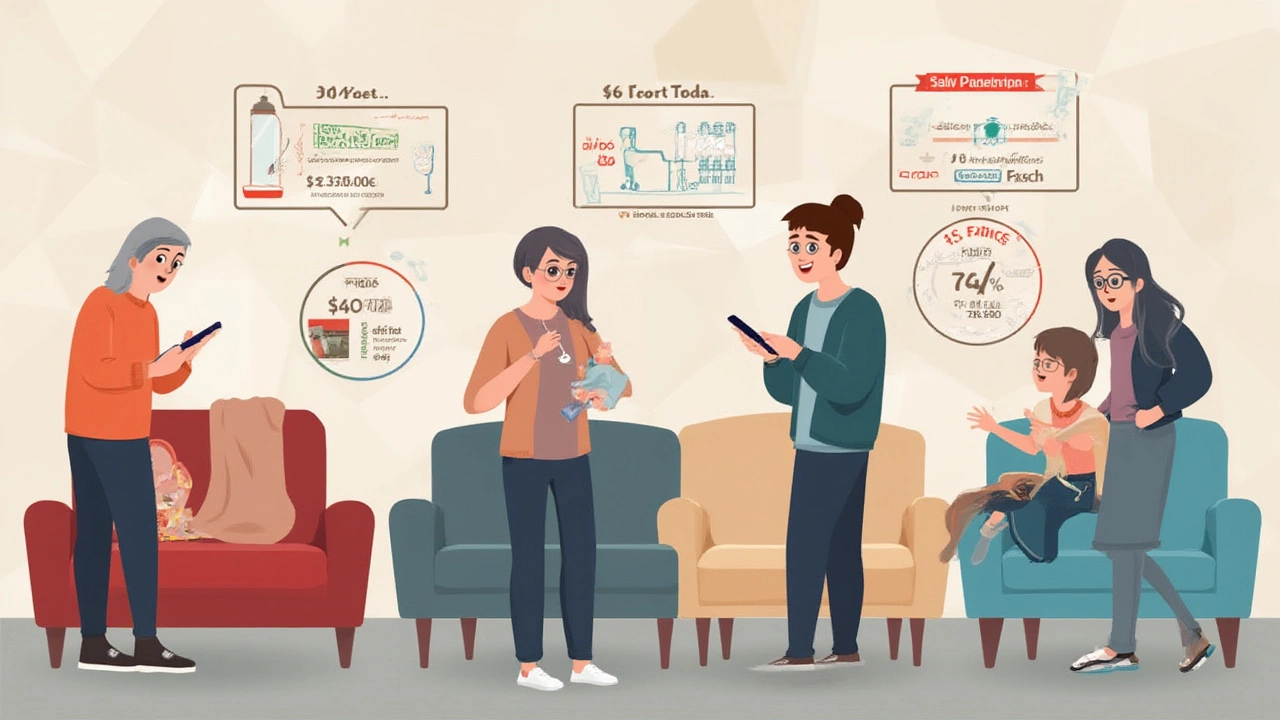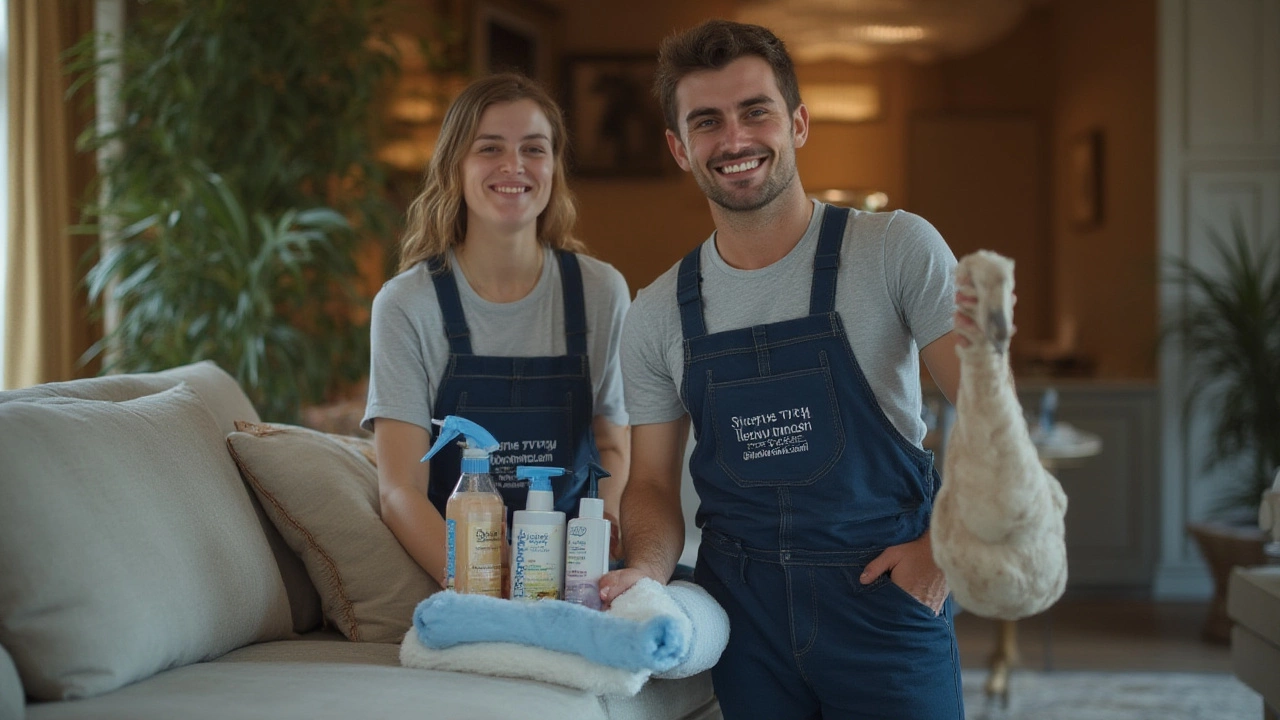Big stain on your cream sofa? Or maybe you’re just noticing your couch smells a bit ‘lived-in’. Either way, the price of getting a fabric couch professionally cleaned catches a lot of people off guard. What’s wild is how much it can swing—a quick scroll through a local Bristol Facebook group, and you’ll see quotes all over the place. Some are cheap enough you worry if they’ll just squirt Febreze and run, while others charge enough that you’d expect the Queen to be sitting on it. So, how much fabric couch cleaning cost can you expect in 2025? Let’s dig into the numbers, the why, and some money-saving moves to make sure your next sofa clean doesn’t clean out your bank account.
What Determines Fabric Couch Cleaning Cost?
The truth is, there’s no single price tag for cleaning a sofa in the UK, and for good reason. Loads of factors come into play, starting with the size and material. A standard 3-seater couch costs less than a huge corner unit, and a simple polyester blend is miles easier (read: cheaper) to clean than delicate velvet or vintage wool. If you’ve got a designer piece, specialist cleaning can bump up the quote through the roof—think double the cost of a plain Ikea sofa.
The cleaning method matters too. Steam cleaning (also called hot water extraction) is the most common, blasting deep into fibres to drag years of dust and mystery stains to the surface. This process is usually a tad pricier than simple shampooing, but it really gets into the grit and is trusted by most pros. Dry cleaning is used for water-sensitive fabrics; it’s gentle, often costs a bit more, and tends to be recommended for pricier sofas with fixed covers.
Location sets the baseline, believe it or not. In Bristol and the South West, average costs run a touch below what Londoners pay—Londoners can fork out 10-20% more for the exact job, easy. Then, there’s the state of the sofa. Heavy staining from kids, pets, or that glass of red you *meant* to keep upright? Expect ‘heavily soiled’ surcharges. Add-ons like stain guarding or odour treatments will also boost your final bill.
Here’s a quick breakdown from 2025 survey data of UK upholstery cleaning services. These are median prices for a single service call:
| Sofa Type | Steam Cleaning | Dry Cleaning | Extra Stain/Odour Treatment |
|---|---|---|---|
| 2-seater | £45-£60 | £60-£80 | £15-£30 |
| 3-seater | £55-£75 | £75-£95 | £15-£30 |
| L-shaped/Corner | £80-£120 | £95-£140 | £25-£40 |
And don’t forget: most companies have a minimum callout fee of around £50, sometimes more if it’s outside their normal patch or on weekends.
If you’re tempted to tackle it yourself, the numbers can look appealing. Hiring a supermarket machine and buying branded upholstery shampoo often costs under £25 for a day, but it comes with its own set of headaches. DIY jobs might not get deep stains out, and some carpet machines are simply too rough for delicate upholstery. Pros spend serious cash on commercial machines that clean deeper, dry faster, and protect the fabric’s texture. Oops—if you accidentally over-wet the stuffing, you might even end up with funkier smells than before, or shrink the fabric. Sometimes saving a few quid isn’t worth the risk!

How to Get the Best Price (And Quality) When Cleaning Your Couch
Picking a company is a minefield. Don’t get sucked in by rock-bottom prices. There are bargain-hunters on Gumtree who’ll ‘clean’ any sofa for under £25, but most of these aren’t insured or even trained in upholstery care. Quality matters; a bodged job can lead to colour bleed, water marks, or a lingering damp smell. So, how do you balance cost and peace of mind?
First up, always check if the quote includes VAT, travel, stain removal, and drying time. Some companies stack extras on after you’ve booked. Transparent pricing usually signals the company knows what they’re doing.
Second, reviews are your friend. Don’t trust Facebook alone—look for Google Reviews or Trustpilot, where fakes are less likely. Reputable cleaners don’t mind if you ask for proof of insurance or industry accreditation. The National Carpet Cleaners Association (NCCA) is a pace-setter in the UK, and many of the best upholstery cleaning pros are members.
Timing can work in your favour. Bookings on weekdays, outside peak moving periods (like school holidays or just before Christmas), usually cost less. Some pros run deals for repeat or off-peak bookings. A number of services offer bundle discounts: need your rugs, curtains, or an armchair looked at, too? Bundle it all for a better rate per item.
Here are some handy pointers:
- Always be clear about your sofa’s material—send a photo if in doubt.
- Ask specifically about drying times. Fast-drying methods (like commercial-grade extraction) mean you can use your sofa again within a couple hours, not days.
- Get quotes from at least three businesses, and ask them to break down exactly what’s included.
- If someone arrives without moving your cushions or testing a patch first, that’s a big red flag.
- Ask if they use eco-friendly or allergy-safe products. Many cities, including Bristol, have companies who specialise in green cleaning and zero harsh chemicals.
And don’t forget to prep your home: vacuum thoroughly to save the pros time (and perhaps spare you a few quid), move fragile objects, and clear a path to the sofa for their big machines.
Industry pro David Neville from Cleaning Matters Magazine puts it bluntly:
No honest professional can give you a quote without knowing the type of fabric, the size, and seeing the stains—it’s not just about time, it’s about using the right method for the job.
Booking a legit cleaner means you’re less likely to get hidden fees, and if something does go wrong, you’ve actually got recourse. Think about it—would you rather save a tenner and buy a new sofa next year, or spend it now to keep your couch looking (and smelling) great for ages?

Fabric Sofa Cleaning: Is It Worth It and How Often Should You Do It?
You’d be surprised how filthy a couch can get in a year. A 2022 Which? Magazine report found most family sofas harbour higher bacteria levels than a toilet flush button, especially around the arm rest and crease lines. Top culprits? Food crumbs, pet dander, pollen, sweat, and natural oils from your skin. Add kids, multiple pets or heavy home use, and suddenly that ‘light grey’ isn’t so light anymore.
Most manufacturers recommend a deep clean at least once a year. If you’ve got allergies or a household full of pets, bump it up to every 6-9 months. Regular cleaning protects warranty on high-end sofas and prevents colours from fading or fabrics from weakening. Some folks even notice their rooms smell fresher—odours get trapped in cushions, and even the sharpest DIY cleaner can miss it.
What about spot cleaning? Always blot spills with a clean cold cloth first—no rubbing. Avoid using grocery store stain removers without doing a patch test; they’re infamous for bleaching or spreading stains. If you’re relying on a professional every time your toddler draws on the armrest in felt-tip, you’ll quickly rack up costs—prevention always wins. Invest in washable throws for high-traffic areas or treat your new sofa with an additional stain guard (just check your fabric type – not all protectors work on every material).
DIY enthusiasts sometimes buy enzyme sprays or use a weak vinegar mix for odours between big cleans, but don’t try anything you haven’t patch-tested. Synthetic blends (like most IKEA sofas) are more forgiving, but wool, velvet or linen can react unpredictably. Be wary of steaming, too—too much moisture, and your couch may dry patchy or even grow mould underneath. If in doubt, ring a pro and check first.
Want your clean sofa to stay fresher for longer? Here’s what works:
- Vacuum weekly, using a nozzle for seams and filler edges.
- Air the room regularly – a stuffy lounge makes odours cling to your soft furnishings.
- Rotate and flip loose cushions every month to distribute wear and tear.
- If your sofa covers are removable and machine washable, do so at the lowest temp with a gentle detergent. Air dry flat to stop shrinking.
Most modern fabric sofas are hard-wearing, but a bad spill or an ignored stain can leave a permanent mark. Regular professional cleaning isn’t about being posh; it’s about extending your sofa’s life, keeping your space healthier, and (let’s be real) avoiding embarrassment the next time you have guests. You don’t need to splash out for the most expensive company on the high street. Get three quotes, trust real reviews, and know that spending a bit for the right cleaner always pays off in the end.
